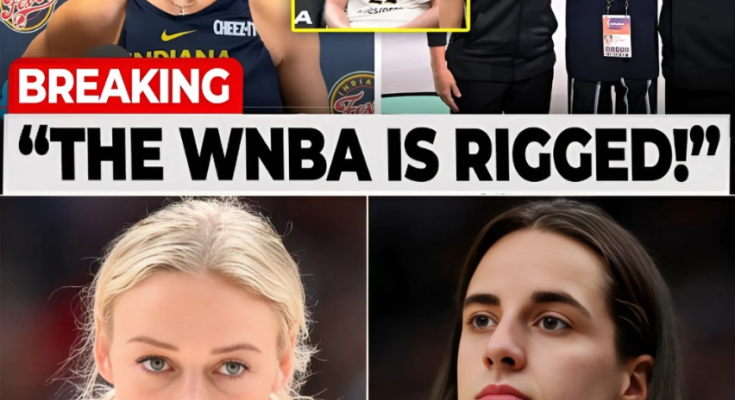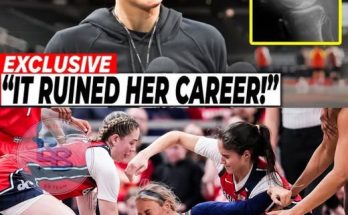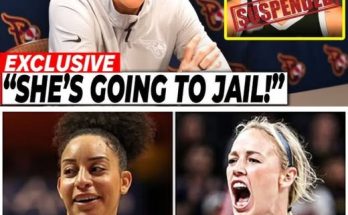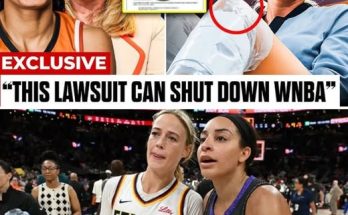The WNBA in Crisis: Sophie Cunningham’s Explosive Revelations Rock the League and Ignite a Firestorm Over Injustice
Introduction: A League at the Crossroads
On a humid summer afternoon, as the basketball world tuned in for what should have been another routine post-game press conference, few could have predicted the seismic shockwaves that were about to ripple through the WNBA.
Sophie Cunningham, a name already known for her fierce competitiveness and unyielding spirit on the court, stepped up to the microphone and did something no one expected: she blew the lid off what she described as a culture of injustice and favoritism that has plagued the league for years.
What began as a reaction to a single, brutal incident—a blatant eye-poke against rookie sensation Caitlin Clark that went unpunished—quickly escalated into a full-blown scandal.
Cunningham’s words, her evidence, and the fallout that followed have forced players, fans, sponsors, and league officials alike to grapple with uncomfortable questions about fairness, transparency, and the future of women’s professional basketball in America.
This is the story of how one player’s courage to speak out might change the WNBA forever.
The Incident That Sparked a Movement
It started innocently enough, as so many controversies do.
The Indiana Fever were locked in a tight contest with the Phoenix Mercury.
Caitlin Clark, the much-hyped rookie whose arrival had already transformed ticket sales and TV ratings, drove to the basket.
In a split second, a defender’s hand lashed out, catching Clark squarely in the eye.
She crumpled to the floor, clutching her face, as the crowd gasped.
But the referees didn’t blow the whistle.
No foul was called.
The game continued.
The replay was damning: slow-motion footage clearly showed a deliberate, forceful poke to Clark’s eye.
Commentators were stunned.
Social media exploded with outrage.
Yet, when the league reviewed the play, they issued no retroactive punishment.
The message was clear: business as usual.
For many, it was just another missed call in a long season.
For Sophie Cunningham, it was the last straw.
History Repeats Itself: Jacy Sheldon in the Crosshairs
Barely a week later, the Mercury faced the Minnesota Lynx.
Jacy Sheldon, another promising young player, found herself on the receiving end of eerily similar treatment.
Once again, a veteran player’s hand caught her in the face.
Once again, referees looked the other way.
The pattern was unmistakable, and for Cunningham, it was intolerable.
Sophie Cunningham’s Press Conference: A Moment of Truth
As reporters filed into the press room after the game, the atmosphere was tense but routine.
Then Sophie Cunningham took the podium.
She didn’t mince words.
“This isn’t just about one play, or one player,” she began.
“This is about a culture that protects certain players and punishes others.
It’s about referees being told to ‘avoid controversy’ by letting veterans get away with things that would get rookies benched or fined.”
She paused, scanning the room.
“And I can prove it.”
What Cunningham revealed next stunned everyone.
She disclosed that she had formally filed a complaint with the league regarding the officiating and the apparent double standard.
But she didn’t stop there.
Cunningham produced what she claimed were internal emails from league officials, instructing referees to “keep the game moving” and “avoid making calls that could spark controversy, especially against established stars.”
The room fell silent.
For a moment, all anyone could hear was the hum of the air conditioning and the frantic tapping of reporters’ keyboards.
The Fallout: Silence, Shock, and Social Media Eruption
Within minutes, the story was everywhere.
Major sports networks broke into regular programming to cover the breaking news.
Hashtags like #WNBAInjustice and #CunninghamSpeaks began trending nationwide.
But inside the league, the reaction was eerily quiet.
Teammates offered no comment.
The Mercury’s media department abruptly canceled all interviews.
League officials declined to respond to requests for clarification.
Then, in a move that sent shockwaves through the business side of the sport, several major sponsors announced they were temporarily suspending their WNBA campaigns pending an internal review.
The league’s carefully cultivated image of unity and progress was suddenly in jeopardy.
A League Divided: Players, Coaches, and Fans React
As the hours ticked by, the basketball world split into camps. Some players quietly voiced support for Cunningham, saying she had articulated frustrations that many had felt for years but were too afraid to express.
Others, particularly veteran stars, accused her of undermining the league and sowing division.
Coaches were equally divided.
“We need to protect our young players,” one head coach told reporters on condition of anonymity.
“If the league isn’t willing to enforce its own rules, we’re going to lose the next generation of talent.”
Fans, meanwhile, were anything but silent.
Message boards, podcasts, and sports radio shows buzzed with debate.
Was Cunningham a whistleblower, bravely exposing a broken system?
Or was she a disgruntled player stirring up trouble for personal gain?
Unpacking the Evidence: What the Emails Really Say
Journalists pored over the leaked emails, which quickly circulated online.
The messages appeared to show league officials advising referees to “use discretion” when calling fouls on veteran players, warning that “controversial calls could damage the league’s reputation and hurt ticket sales.”
Legal experts weighed in, noting that while leagues often communicate with officials about game management, explicit instructions to ignore infractions by certain players could raise serious ethical—and potentially legal—questions.
The WNBA, for its part, released a terse statement: “We are aware of the allegations and are conducting a thorough review. The integrity of our game is paramount.”
The Broader Context: A History of Controversy
For longtime followers of the WNBA, Cunningham’s revelations tapped into a deep well of frustration.
Over the years, players have quietly complained about inconsistent officiating and the perception that star players receive preferential treatment.
The league, eager to grow its audience and attract sponsors, has sometimes seemed more interested in protecting its brand than addressing these concerns.
But never before had a player spoken out so publicly, with such detailed evidence.
Why This Matters: The Stakes for Women’s Sports
At its core, this controversy is about more than just basketball. It’s about fairness, transparency, and the right of athletes—especially women—to compete on a level playing field.
The WNBA has long positioned itself as a progressive force in professional sports, championing equality and social justice.
Now, those values are being put to the test.
If Cunningham’s allegations are true, they raise troubling questions about the league’s commitment to those ideals.
Can the WNBA afford to ignore the voices of its own players?
What message does it send to young girls dreaming of one day playing professionally if the rules don’t apply equally to everyone?
The Players’ Union Responds
Within 24 hours, the WNBA Players Association released a statement expressing “serious concern” over the allegations and calling for an independent investigation.
“Our players deserve to know that the game is fair and that their safety is a priority,” the statement read. “We will not rest until these issues are addressed.”
Behind the scenes, union leaders began organizing meetings with players from every team, urging them to document any incidents of unfair treatment or inconsistent officiating.
Sponsors and the Business of Basketball
The reaction from sponsors was swift and decisive. Several major brands, including apparel companies and beverage giants, announced they were suspending their partnerships with the WNBA pending the outcome of the investigation.
For a league that has fought for every dollar of sponsorship and every minute of national TV coverage, the financial stakes could not be higher. If advertisers decide the league is too risky or controversial, it could set back years of progress.
The League’s Next Move: Crisis Management or Real Reform?
As the dust begins to settle, all eyes are on the WNBA’s leadership.
Will they attempt to sweep the controversy under the rug, hoping the news cycle moves on?
Or will they seize the moment to enact real reform, restoring trust among players, fans, and sponsors?
Sources inside the league say a special meeting of team owners and league officials is being planned, with the future of commissioner Cathy Engelbert potentially hanging in the balance.
Voices from the Past: Lessons from Other Sports
The WNBA is hardly the first professional league to face allegations of favoritism or cover-ups.
The NBA, NFL, and even the Olympics have all weathered scandals involving officiating, player safety, and transparency.
But the stakes are different here. The WNBA is still fighting for mainstream acceptance, for equal pay, and for respect in a crowded sports marketplace.
How it handles this crisis could shape its legacy for decades to come.
Sophie Cunningham: Hero or Villain?
As the story continues to unfold, one question looms large: What drives Sophie Cunningham?
Is she a hero, risking her career to expose the truth?
Or is she a troublemaker, using controversy to settle personal scores?
Interviews with those who know her paint a complex picture. Teammates describe her as fiercely loyal and unafraid to speak her mind.
Coaches say she’s the kind of player who makes everyone around her better, but who won’t tolerate injustice.
For Cunningham, the answer seems simple.
“I love this game,” she told reporters.
“I just want it to be fair. For everyone.”
The Road Ahead: Can the WNBA Rebuild Trust?
As the league launches its investigation and the media spotlight intensifies, the WNBA faces a defining moment.
Will it listen to the voices of its players and fans?
Will it address the issues Cunningham has raised, or will it retreat into damage control?
For now, one thing is certain: the eyes of the sports world are watching.
The outcome of this crisis will not only determine the future of the WNBA, but could also set a precedent for how women’s sports are governed and perceived in America.
Conclusion: A Turning Point for Women’s Basketball
In the end, the story of Sophie Cunningham and the WNBA is about more than just one player or one league.
It’s about the power of speaking truth to power, the importance of fairness, and the enduring belief that sports can be a force for good.
Whether the league emerges stronger or weaker from this crisis remains to be seen.
But one thing is clear: the days of silence are over. The game—and those who love it—will never be the same.



